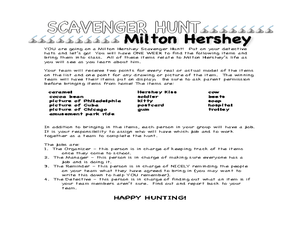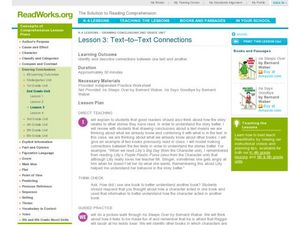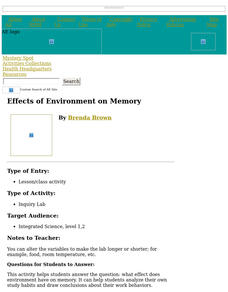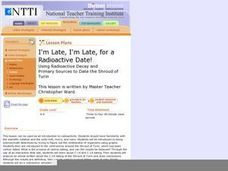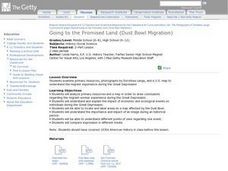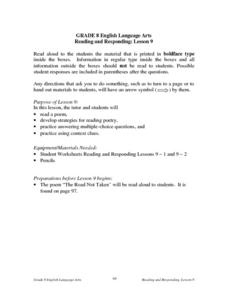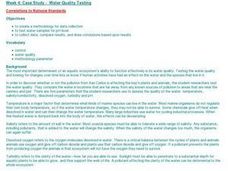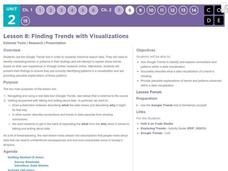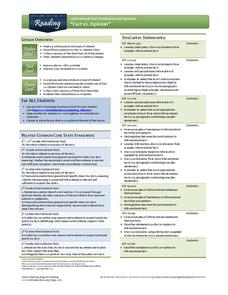Curated OER
Mock Investigation
Students explore detective investigations. In this introduction to mysteries lesson, students role play eye witnesses and investigators related to a "crime" committed in their classroom. Students collect evidence and record information,...
Curated OER
Milton Hershey Scavenger Hunt
Students participate in a scavenger hunt. In this Milton Hershey lesson, students prepare for a trip to the Hershey Museum in Pennsylvania by completing a scavenger hunt. Students draw conclusions on their findings.
Curated OER
Text-to-Text Connections
Help youngsters make connections between two different texts. They read two stories about the same character, Ira Sleeps Over and Ira Says Goodbye. They discuss how the character of Ira acts in each of the stories, how he...
Curated OER
Effects of Environment on Memory
Students explore the effect that environment has on memory. They analyze their own study habits and draw conclusions about their work behaviors. Baseline capacity is established for the subjects' ability to memorize an increasing series...
Curated OER
I'm Late, I'm Late, for a Radioactive Date!
Through the use of an interactive Web site, learners explore C-14 and C-14 dating. Then students analyze an article written about the C-14 dating of the Shroud of Turin and draw conclusions.
Curated OER
Global Warming Statistics
Students research real-time and historic temperature data of U.S. and world locations, and analyze the data using mean, median, and mode averages. They graph the data and draw conclusions by analyzing the data. A spreadsheet is used to...
Curated OER
Going to the Promised Land
Learners analyze primary resources and map in order to draw conclusions regarding the migrant-worker experience during the Great Depression. They explain and explain the impact of economic and ecological events on individuals.
Curated OER
Plate Tectonics
Students research separate elements of the theory of Plate Tectonics, then share that information with each other, drawing conclusions from the culminated information.
Curated OER
Egypt's Greatest Leaders
Students study about seven of Egypt's most famous pharaohs. They discuss leadership styles and draw conclusions about the success of each of these pharaohs. They, in groups, create a project about a pharaoh they studied.
Curated OER
Environment: Wild Wind Direction
Students examine the different types of wind patterns. Using common materials, they construct weather vanes to measure and record wind direction over a two-week period. After analyzing the data, they draw conclusions about the...
Curated OER
Reading and Responding -- Lesson 9
Fourth graders work independently or in a small group with a tutor or teacher to (1) read a nonfictional selection, (2) practice drawing conclusions, (3) identify main ideas, and (4) practice responding to cause and effect questions.
Curated OER
Data Analysis, Probability, and Discrete Mathematics
Fourth graders analyze the data in a bar graph, pictograph, line graph, and a chart/table and draw conclusions based on the data. They discuss each type of graph, write questions for each graph, and analyze the data as a class.
Curated OER
Water Quality Testing
Student explore factors affecting ecosystems. They test local water samples for pH level. After creating a methodology for data collection, they collect data, compare results, and draw conclusions based upon results.
Curated OER
A History of Conflict
Students explore issues contributing to current tensions between Pakistan and India, drawing conclusions about how the conflict came about and where it may be heading. They Participate in an in-class "diplomacy summit"; create a...
Curated OER
Rivers Through Time
Students read or have the book A River Ran Wild read to them. They discuss and reflect on the messages presented in the book. Students use their listening comprehension skills to draw conclusions. Students articulate several examples of...
Curated OER
Student Designed Investigations Part 3 – Collecting Data and Drawing Conclusions
Students explore how living things adapt to their environment. In this science lesson, students conduct scientific investigations to examine animal adaptations.
Curated OER
Text Clues and Background Knowledge
Teach youngsters how to evaluate background knowledge, pictures, and context clues to draw a reasonable conclusion about a story. They practice using the discussed clues as they read the story, Alexander and the Terrible, Horrible,...
College Board
Teaching Students How to Write AP Statistics Exam Responses
But this is math—we don't need to know how to write! The article makes a point that class members in AP® Statistics should be comfortable writing as the exams require it. Individuals quickly realize that quality writing is crucial...
G. Turrell
Science Activity 1: Light & Sound
Are you looking for lab sheets to go with your class experiment on plant response to light? You are no longer in the dark! This is a lesson that was written for a unit on light, but could easily be used to demonstrate plant behaviors in...
Code.org
Finding Trends with Visualizations
Pupils often hear about trends, but they don't always see them. The eighth lesson plan in a unit of 15 requires individuals to use the Google Trends tool. Class members identify patterns in the visualization before presenting the...
School District of Palm Beach County
Framed Paragraphs characterization, problem and solution, symbolism, conflict
Support your learners as they work on writing paragraphs by providing graphic organizers, outlines, and frames. Sift through this packet to find the perfect organizers and templates to prepare pupils for writing. The resource...
PBS
Predicting/Making a Hypothesis
As an introduction to the hypothesis and testing method of investigation, young history detectives engage in a special investigation of a family artifact. After watching a short video that demonstrates the method, they develop a...
For the Teachers
Fact vs. Opinion
Many informational texts are written as factual, but can your learners determine when an opinion is presented as fact? Have your kids read several articles on the same topic and record the statements that contain either facts or...
Curriculum Corner
Inferencing
Inferencing is a necessary reading skill to uncover non-explicit messages in text. Use the set of resources as a way to guide learners toward becoming expert inferrers through reading prompts and literature with text and without text.
Other popular searches
- Drawing Conclusions Reading
- Data. Drawing Conclusions
- Drawing Conclusions Lessons
- Drawing Conclusions in Reading
- Data Drawing Conclusions
- Reading "Drawing Conclusions
- Drawing Conclusions Worksheets
- Drawing Conclusions Science
- Drawing Conclusions From Text
- Drawing Conclusions Activities
- Drawing Conclusions From Data



